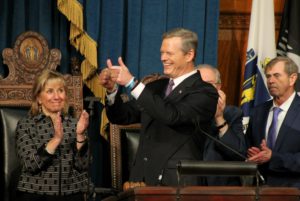
Gov. Charlie Baker gives a thumbs-up sign as he deliveres his second inaugural speech Jan. 3, 2019 in the House Chamber. (State House News Service Photo / Sam Doran)
With Gov. Charlie Baker considers traditional borrowing sources to meet the state’s transportation infrastructure needs, one prominent House Democrat is calling himself a “zealot” for additional financial resources and sees a higher gas tax as an option that can’t be ignored.
Baker said Monday that he plans to file a major transportation borrowing bill in the next 30 to 60 days that will outline his infrastructure priorities for the next five years. The nod to additional borrowing for transportation, a longstanding practice that usually does not involve new revenues, came in response to a question from a reporter about whether he was open to an omnibus transportation financing bill.
The legislature passed a five-year, $12.7 billion transportation borrowing bill in 2014 under Gov. Deval Patrick’s administration.
“We’re going to file a transportation bond bill sometime in the next 30 to 60 days that lays out what I would describe as our plan for how we would deal with transportation spending over the course of the next five years and I fully expect that will probably be something that will get a lot of deliberation from the legislature over the course of the next 12 to 18 months,” Baker told reporters.
MBTA officials on Monday were also talking about their five-year, $8 billion capital spending plan. During a scrum with reporters after swearing in members of the state’s reconstituted Economic Development Planning Council, Baker called it “the largest five-year spend in the history of the T, by a mile.”
Baker’s focus on long-term borrowing comes as Democratic legislative leaders, prodded by advocacy groups who want more spending on transportation now, are exploring other revenue-raising options. The legislature last week went on record in support of a redrafted constitutional amendment imposing a 4 percent income surtax on households with incomes above $1 million per year.
The measure, which will resurface for amendments and debate at the June 12 Constitutional Convention, is designed to raise $2 billion a year, with those revenues earmarked for education and transportation investments. The amendment, however, could not start generating revenues until 2023 at the earliest, and House and Senate Democrats currently appear far from a consensus on other new revenues.
Transportation Committee Co-Chairman William Straus, a Mattapoisett Democrat, said last week that the best path for “gaining public acceptance” for new revenues is to make sure that no matter where the money comes from it goes into a dedicated trust fund where it can only be spent for infrastructure.
“I think the speaker in a number of different public statements so far this year has made it clear that added revenue for transportation is very much on his mind, it’s very much on the membership’s mind and [also] I consider myself a zealot in terms of advocating for transportation resources,” Straus told a small group of reporters last week.
Straus said he anticipates that later this year “there will be revenue options presented to the membership for transportation.” He said he didn’t know if there would be a proposal exclusive to transportation or if it would be dealt with as part of a larger package to fund other priorities like education.
“For the kind of money that’s needed in order to get the road and bridge and the transit system to a state of good repair, which means 80 percent good or better, it’s very hard to build that kind of financing without looking at the gas tax,” Straus said.”There are other revenue options that people are discussing that do deal with traffic and congestion issues, so I don’t think just a gas tax is the way to go, but it’s hard to imagine getting enough revenue without that being a part of it.”
While he predicted that the issue of indexing the gas tax to inflation is a non-starter now after voters repealed that in 2014, Straus said that for every penny added to the 24-cent gas tax the state could collect an additional $35 million to $40 million.





